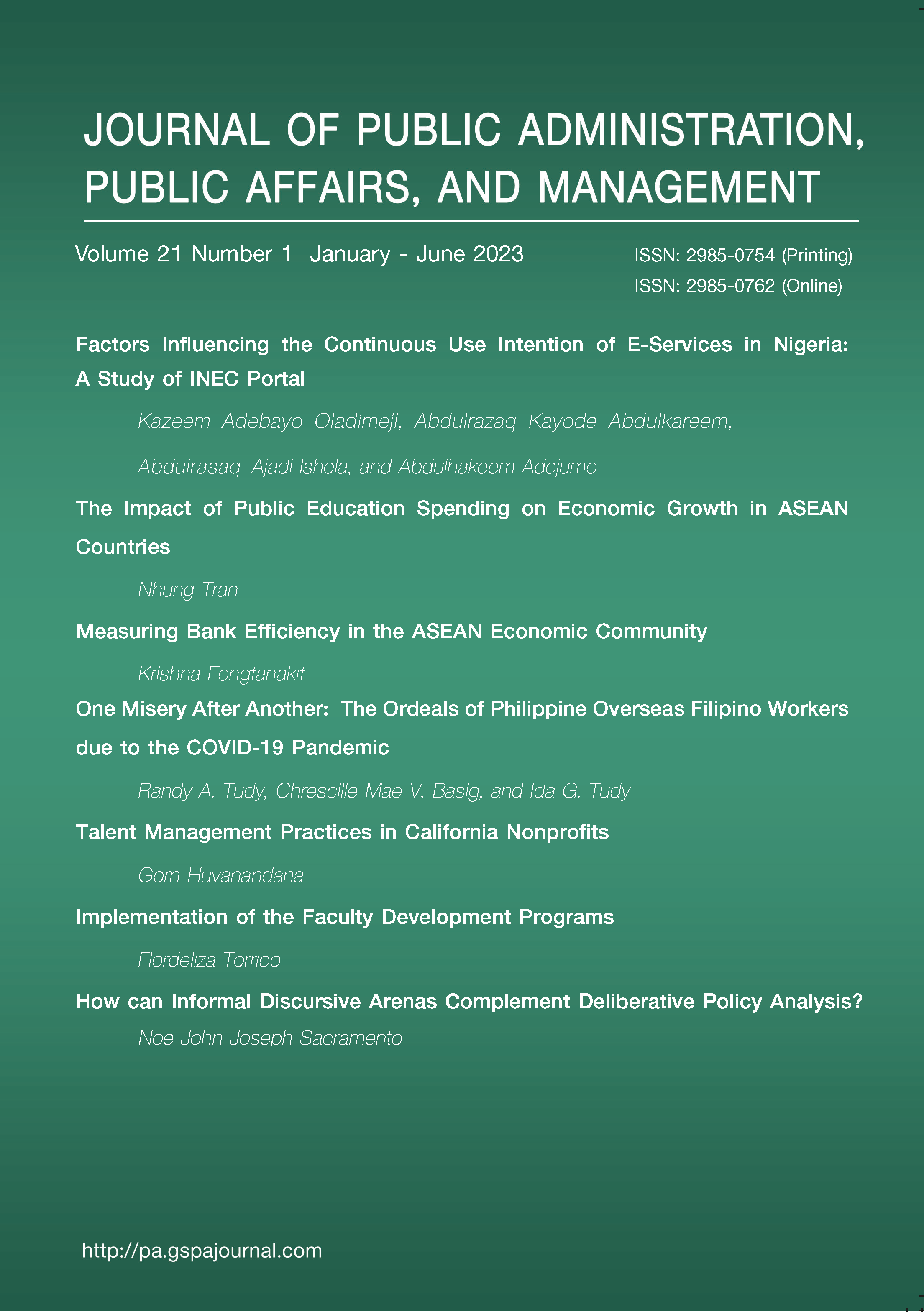Factors Influencing the Continuous Use Intention of E-Service in Nigeria: A Study of INEC Portal
Keywords:
Service Quality, ICT, Trust, Satisfaction, Information QualityAbstract
This study examined the factors influencing the continuous use intention of e-services in Nigeria, with reference to the Independent National Electoral Commission portal. Through a quantitative survey, the study examined the influence of information systems qualities on user satisfaction and post-use trust in the INEC portal. Also, it examines the influence of user satisfaction and post-use trust on the continuous use intention of the INEC portal. The survey generated responses from 286 respondents. The findings of the study showed that the information system qualities have significant effects on user satisfaction and post-use trust. also, user satisfaction and post-use trust are significantly related to the continuous use of the INEC portal. The results imply that the government’s conscious drive towards the adoption of ICT for election purposes in Nigeria can only gain relevance and wide adoption when the quality of the information, system and services are improved upon. Trust is an important predictor of adoption, therefore, for the citizens to trust the system, their initial experience with the use of the portal should be positive. Trust in the system will drive wider adoption and credibility in the system.
References
Abdulkareem, A. K. (2015). Challenges of e-government implementation in the Nigerian public service. Journal of Creative Writing, 1(4), 45-56.
Abdulkareem, A. K., Abdulkareem, Z. J., Ishola, A. A., & Akindele, I. T. (2022). Does e-government impact e-participation? The influence of trust in e-government. International Review of Public Administration, 27(2), 91-110.
Abdulkareem, A. K., Ameen, A., & Ishola A. A. (2015). A review of e-government as a tool for building citizens trust in the Nigerian government. Sahel Analyst: Journal of Management Sciences, 13(2), 77- 86.
Abdulkareem, A. K., & Ramli, R. M. (2021a). Does digital literacy predict e-government performance? An extension of Delone and Mclean information system success model. Electronic Government, an International Journal, 17(4), 466-493.
Abdulkareem, A. K., & Ramli, R. M. (2021b). Does trust in e-government influence the performance of e-government? An integration of information system success model and public value theory. Transforming Government: People, Process and Policy, 16(1), 1-17.
Al-Hussein, M. A. H. A., Alabdallat, W. I. M., Rumman, M. A. A., Jawabreh, O., & Ali, B. J. A. (2023). Impact of e-government applications on reducing administrative burden in delivering public service. Information Sciences Letters, 12(3), 1663-1671.
Al-Maroof, R. S., & Salloum, S. A. (2021). An Integrated model of continuous intention to use of google classroom. In Recent Advances in Intelligent Systems and Smart Applications. Springer.
DeLone, W. H., & McLean, E. R. (2003). The DeLone and McLean model of information systems success: A ten-year update. Journal of Management Information Systems, 19(4), 9-30.
Doran, N. M., Puiu, S., Bădîrcea, R. M., Pirtea, M. G., Doran, M. D., Ciobanu, G., & Mihit, L. D. (2023). E-government development—A key factor in government administration effectiveness in the European Union. Electronics, 12(3), 641.
Duruji, M. M., Olanrewaju, F. O., Olu-Owolabi, F. E., Duruji-Moses, F. U., & Chukwudi, C. (2021). Digital government in the electoral process: Implications for elections in Nigeria. African Renaissance, 18(2), 251-274.
Enaifoghe, A., Dlamini, N. P., Jili, N. N., & Mthethwa, R. (2023). The role of e-government as enabler of good governance for socio-economic development in South Africa. International Journal of Social Science Research and Review, 6(1), 493-508.
Hernandez-Ortega, B. (2011). The role of post-use trust in the acceptance of a technology: Drivers and consequences. Technovation, 31(10-11), 523-538.
INEC. (2022). INEC Strategic Plan 2022-2026: Consolidating Free, Fair, Credible and Inclusive Elections.
Ishola. A., Abdulkareem, A., & Bello, M. L. (2021). Transforming public service delivery from the line to online in Nigeria: Leveraging on ICT tools. Acta Universitatis Danubius. Administratio, 13(1), 7-19.
Kayode, A. A., Lawan, B. M., Ajadi, I. A., & Lukman, J. A. (2020). E-Government, information and communications technology support and paperless environment in Nigerian public universities: issues and challenges. Journal of Technology Management and Business, 7(1), 65-74.
Kirfi, M. M. W., & Ishola A. A. (2018). E-Government Implementation in Nigeria: Exploring Panacea for Good Governance. Kashere Journal of Humanities, Management and Social Sciences, 2(1), 85-97.
Li, W., & Xue, L. (2021). Analysing the critical factors influencing post-use trust and its impact on citizens’ continuous-use intention of e-government: Evidence from Chinese municipalities. Sustainability, 13(14), 7698.
Li, Y., & Shang, H. (2020). Service quality, perceived value, and citizens’ continuous-use intention regarding e-government: Empirical evidence from China. Information and Management, 57,(3), 1-15.
Malodia, S., Dhir, A., Mishra, M., & Bhatti, Z. A. (2021). Future of e-government: An integrated conceptual framework. Technological Forecasting and Social Change, 173, 1-17.
Nofal, M. I., Al-Adwan, A. S., Yaseen, H., & Alsheikh, G. A. A. (2021). Factors for extending e-government adoption in Jordan. Periodicals of Engineering and Natural Sciences, 9(2), 471-490.
Okeke, G. S. M., & Nwali, U. (2020). Campaign funding laws and the political economy of money politics in Nigeria. Review of African Political Economy, 47(164), 238-255.
Ringle, C. M., Sarstedt, M., Mitchell, R., & Gudergan, S. P. (2020). Partial least squares structural equation modeling in HRM research. The International Journal of Human Resource Management, 31(12), 1617-1643.
Udu, L. E. (2015). INEC and 2015 general elections in Nigeria: Matter arising. Democracy, 5(12), 96-108.
Veeramootoo, N., Nunkoo, R., & Dwivedi, Y. K. (2018). What determines success of an e-government service? Validation of an integrative model of e-filing continuance usage. Government Information Quarterly, 35(2), 161-174.
Downloads
Published
How to Cite
Issue
Section
License

This work is licensed under a Creative Commons Attribution-NonCommercial-NoDerivatives 4.0 International License.



